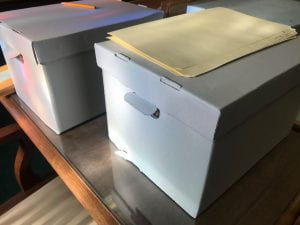By Rachel Jacob, Armstrong Browning Library Graduate Research Assistant
Beginning graduate school is an intimidating endeavor. There are questions swirling in your mind such as whether or not you can make it through, if this graduate school was the right choice, and if you will enjoy the work when it actually becomes your job. I was fairly confident that I would be able to handle the academic requirements of graduate school. It was my graduate assistantships that concerned me the most. I could not be sure that I would be good at my job. Of course, it was not expected for me to already be experienced and know what I was doing. The point of a graduate assistantship is to give you that experience and that practical knowledge. But still, I had questions which needed answering.
One of the first substantial jobs I did at the Armstrong Browning Library was to organize materials from Browning societies or clubs across the world. Before my graduate assistantship at the ABL, I had no idea that the Brownings were such monumental figures in literature. I had read some of Robert and Elizabeth’s poetry, but was completely unaware of the devoted fans who follow them and their works to this day. The task of organizing and cataloguing the materials from different Browning societies opened my eyes to this fascination that still surrounds them. Each Browning society met consistently to discuss literary topics, mainly focused around the Brownings. With each society came things such as a yearbook for each year the club was in existence, meeting notices for each meeting, programs for every special event, and newspaper clippings with mentions of the club or the Brownings. The clubs spanned from Waco, to Seattle, to New York, to Manchester England. Certain clubs had materials which spread decades and generations. Some of these club are still in existence today.
At the start of this project, I was processing the yearbooks or meeting notices from different societies. Once I finished organizing and cataloging those, I began work on the New York Browning Society’s materials. This was separate from the yearbooks. In this material there were financial records, meeting minutes, bulletins, and event programs, and other miscellaneous society materials. This portion of the collection was mainly from the 1970’s through the 1990s. Unlike the yearbooks, which needed to be re-homed and catalogued, this material was partially unorganized. This presented new obstacles for archival work. There were certain areas of the materials which were organized with a clear original order. Those materials were not to be rearranged because the original order is kept as intact as possible. However, this whole collection did not have an original order. For the sections which no original order could be determined, it was my responsibly to decide what the best order was for these materials. This required intellectually and physically rearranging these materials to help them to make sense with the original order, while also being usable for research.
This whole project not only taught me about the enthusiasm that encompasses the Brownings, but also vital archival skills. Every object had to be arranged chronologically, catalogued, and described before being re-homed in a document box. This is basic archival work which I knew in theory, but was able to receive practical experience in.
The most important thing which this project, and everything I have done at the Armstrong Browning Library this semester, taught me was the answer “it depends”. There were countless times I would ask questions about organizing, archival processes, or the way things were done at the ABL to receive the answer “it depends”. In archival work, there is not always a right answer or an obvious choice. There are many variables that lead to the solution, and often times it is up to the archivist to make the decisions which will lead to the best solution.
Once I began receiving the answer of “it depends” at the ABL, I noticed that questions in my classes were answered with an it depends as well. In the museum field, there may be no right answer, no one-size-fits-all answer. Instead, the classes and the experiences of our graduate assistantships are giving us the information necessary to create our own framework to know how to proceed when the answer is “it depends”. I may still have the questions which I had at the beginning of the year, and this semester may have raised other questions in my mind, but I am in a program and working graduate assistantships which are teaching me how to answer my questions. And I look forward to continuing to learn through my experiences, particularly with archival and conservation work at the ABL in order to continue in their mission to preserve the Brownings in order to encourage the continued study of their works.

